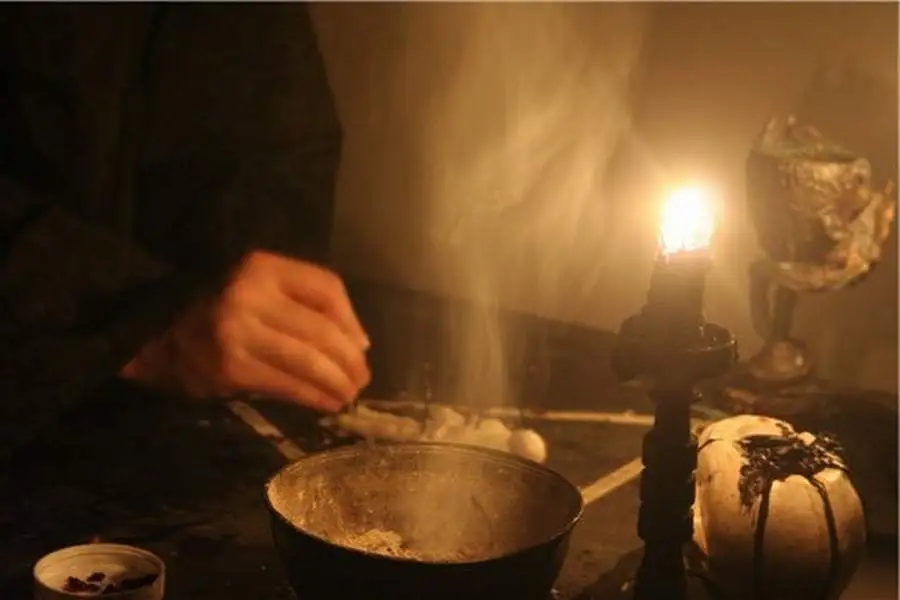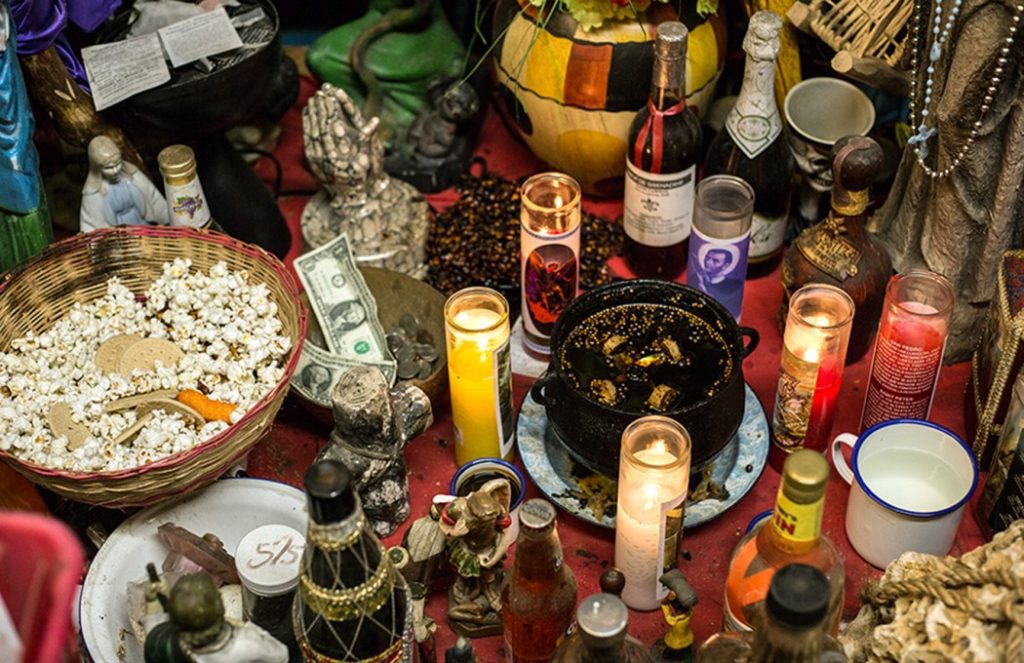Black salt in witchcraft is a potent, symbolic tool known for its strong protective and banishing properties. Unlike the culinary black salt found in cooking, this magical version is typically crafted from a blend of sea salt, ashes, charcoal, and other protective herbs or minerals, each chosen for its energy-cleansing qualities. Witches and practitioners use black salt to ward off negativity, break harmful patterns, and create energetic barriers around people, objects, or spaces.
In rituals, it may be sprinkled around a home’s perimeter for protection, placed in charm bags to repel unwanted influences, or incorporated into spellwork designed to banish toxic energy. Recipes for black salt vary widely, often reflecting a practitioner’s personal intuition and cultural tradition, making it not only a functional ingredient but also a deeply personalized expression of magical intent.
Black Salt Witchcraft
- Black salt is a tool in witchcraft for protection, banishing, and cleansing.
- It can be made using activated charcoal or ashes with sea salt, resulting in different colors and prowess.
- Various ingredients can be tailored to black salt to suit specific magical intents.
- Black salt has practical uses in spell jars, home protection, and personal care, among others.
- Cultural significance and application methods of black salt are diverse and fascinating.
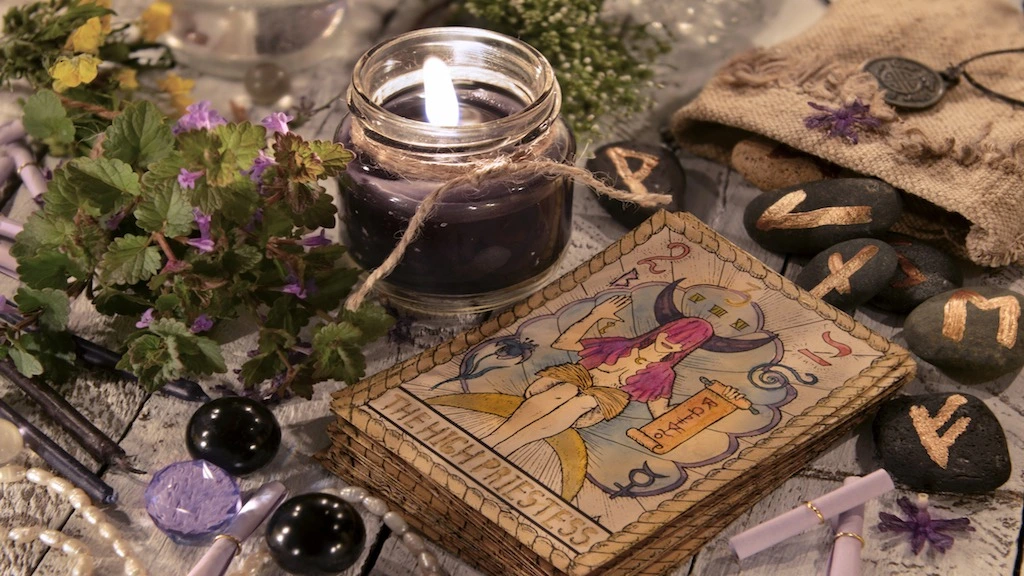
The Essence of Black Salt Witchcraft in Magic
Black salt in witchcraft is a compound traditionally crafted by blending sea salt with either activated charcoal or the ashes of burned herbs and incense. When created with activated charcoal, the result is a profound black hue, whereas ashes produce a gentler grey tone. The choice of ashes can range from specific herbs and incense to even iron shavings, each adding a targeted intention to the black salt’s purpose in rituals.
Herbs and Incense for Black Salt
The ashes of several herbs and woods are often incorporated into black salt for their associated magical properties:
- Basil – Notably for banishing, protection, and spell-breaking.
- Cedarwood – Employed in cleansing and protection spells.
- Cypress – A botanical shield in protection magic.
- Dragon’s Blood – A powerful all-rounder for cleansing, protection, cursing, and banishing.
- Frankincense – Another cleanser, also used for protection and breaking spells.
… and many others offer their unique capabilities to the practitioner’s intentions.
Other Ingredients
Adding further complexity, black salt may include:
- Black pepper – For cleansing and protection.
- Cayenne pepper – To drive away unwanted influences.
- Iron shavings – As a symbol of fortitude and defense.
- Various salts like garlic or onion – Known for their cleansing and protective attributes.
Crafting Black Salt
Making black salt is a simple yet intentional process:
- Combine selected ingredients based on your intent.
- Grind them together using a mortar and pestle or grinder.
- Store and label it, respecting its potent energy.
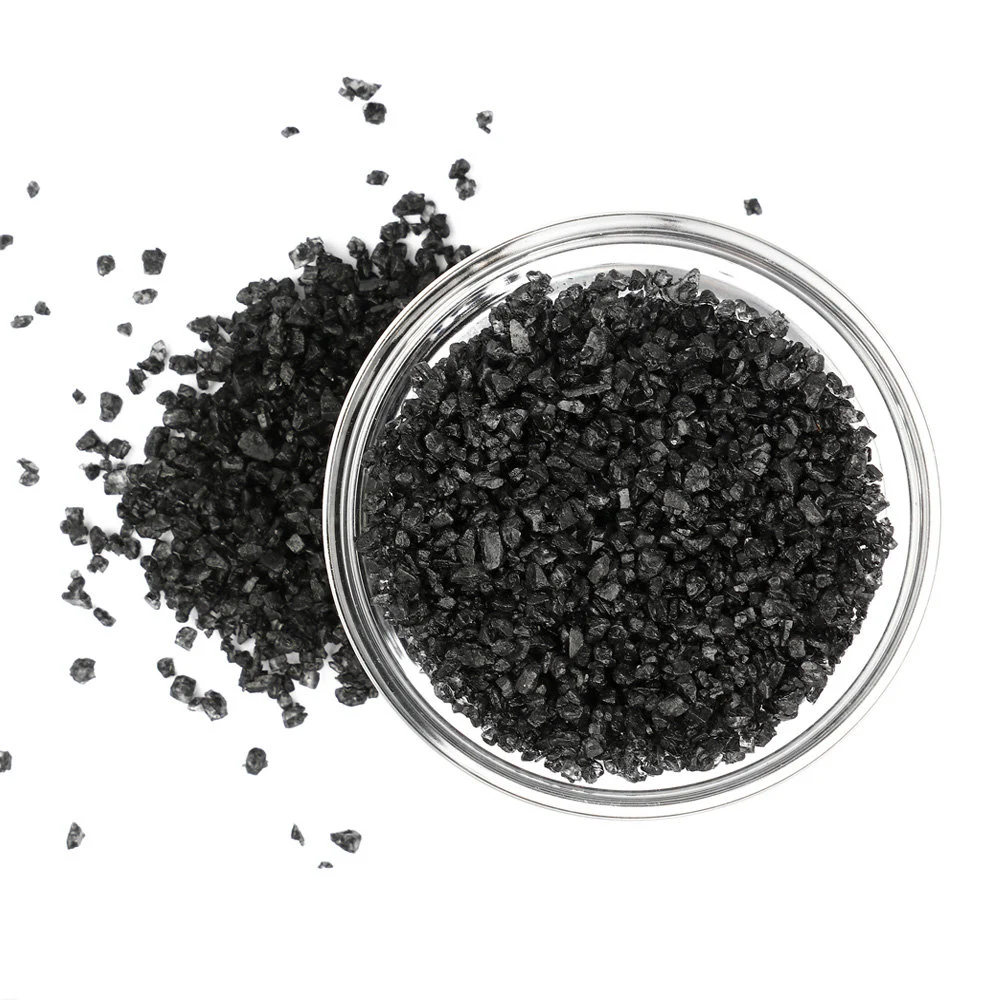
Black Salt in Practice
Uses of black salt are immensely diverse:
- Sprinkle around the home as a safeguard.
- Employ in spell jars or sachets as a concentrator of energy.
- Create barriers or cleanse objects carrying negative vibrations.
- Contribute to personal well-being when used in skin-safe formulations.
Understanding Black Salt Beyond Witchcraft
Is Black Salt Real?
Distinct from the culinary black salt, the witch’s black salt is indeed real within the craft where it’s revered for its spiritual and protective qualities.
What Culture Uses Black Salt?
While black salt is employed in magical practices globally, its use is prevalent within Wiccan, Pagan, and various folk magic traditions.
Black salt is used in various cultures around the world, but its specific type and usage can vary. Here are a couple of cultures where black salt is commonly used:
- South Asian Cuisine (Indian, Pakistani, and Nepali): In South Asian cuisines, particularly Indian, Pakistani, and Nepali, a type of black salt known as “kala namak” is widely used. Kala namak is a rock salt that is brownish-black in color and has a distinct sulfurous taste and smell. It is a popular ingredient in various dishes, including chaats, chutneys, pickles, and snacks.
- Ayurveda (Traditional Indian Medicine): In Ayurvedic medicine, black salt, especially the Himalayan black salt, is sometimes used for its supposed health benefits. It is believed to have cooling properties and is used in Ayurvedic recipes and remedies.
- Some Middle Eastern and Central Asian Cuisines: In certain Middle Eastern and Central Asian cuisines, black salt may also be used in specific dishes, though it might not be as common as in South Asian cooking.
Where Can I Use Black Salt?
Black salt, depending on the type (such as kala namak or Himalayan black salt), can be used in various culinary applications. Here are some common uses for black salt:
- Indian Cuisine:
- Chaats: Black salt is often sprinkled on various Indian street foods and chaats for its distinctive flavor.
- Chutneys: It can be used in chutneys to add a tangy and slightly sulfurous taste.
- Raita: Black salt can enhance the flavor of yogurt-based dishes like raita.
- Snacks and Seasonings:
- Popcorn: Sprinkle a small amount of black salt on popcorn for a unique twist.
- Fruit Salads: Some people enjoy using black salt on certain fruit salads to add a savory element.
- Beverages:
- Mocktails and Cocktails: A small pinch of black salt can be added to certain beverages for a salty kick. It’s commonly used in Indian beverages like Jaljeera.
- Ayurvedic Recipes:
- Ayurvedic Drinks: In Ayurveda, black salt, especially Himalayan black salt, is sometimes used in certain health drinks for its perceived benefits.
- Pickles and Fermented Foods:
- Pickles: Some recipes for pickles call for the use of black salt.
- Fermented Foods: It can be used in certain fermented dishes for added flavor.
- Seasoning:
- Seasoning Grilled Vegetables: Black salt can be sprinkled on grilled vegetables for extra taste.
- Seasoning Tofu or Paneer: It can be used as a seasoning for tofu or paneer dishes.
Why Does Black Salt Smell?
Black salt can carry a distinctive scent due to the presence of sulfur in certain components like himalayan black salt, not to be confused with witchcraft’s black salt, which may have varied aromas based on the ashes or herbs used.
Incorporating Black Salt into Daily Practice
Incorporating black salt into daily culinary practices can elevate the flavors of your dishes with its unique and distinctive taste. Whether used as a finishing touch on savory salads and grilled vegetables or sprinkled on snacks like popcorn or roasted nuts, black salt adds a layer of complexity that sets it apart. Its slightly sulfurous flavor makes it a versatile ingredient in homemade chutneys, sauces, and dips, enhancing the overall taste profile. For those interested in mixology, a pinch of black salt in mocktails or cocktails can provide an unexpected and delightful twist, especially when paired with citrus flavors.
Exploring its use in fruit salads, pickles, and fermented foods offers a chance to experiment with the balance of sweetness and complexity in different culinary creations. Embracing black salt in daily cooking, especially in Indian cuisine, allows for a broader palette of flavors and a nuanced approach to seasoning. Start with small amounts, adjusting to your taste preferences, and enjoy the unique touch that black salt brings to your culinary endeavors.
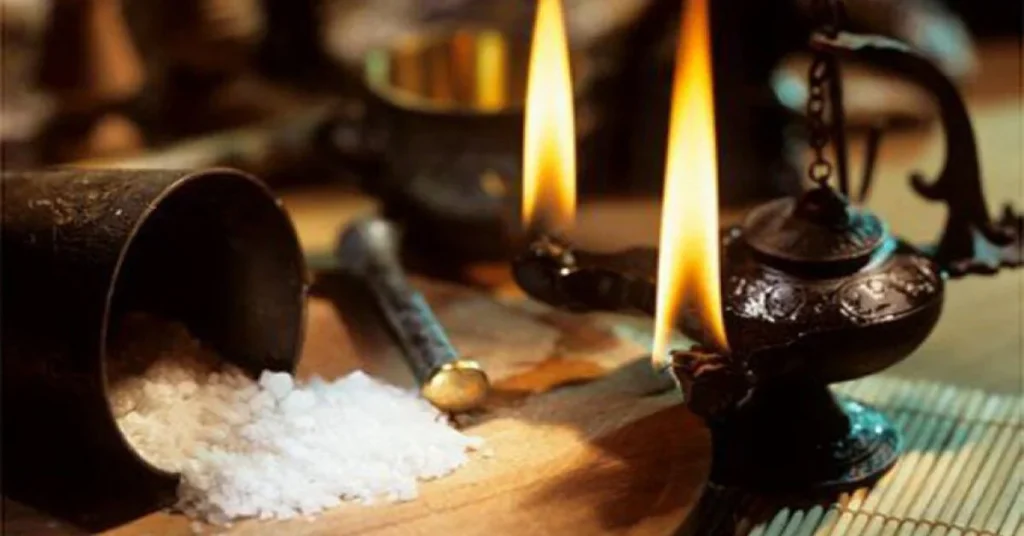
Unraveling the Mysteries of Black Salt Witchcraft
What does black salt do to your body?
In a spiritual sense, black salt is believed to shield one’s personal energy field from negative influences. Physically, the ingredients in black salt may not be intended for consumption as they are not food-grade substances.
What is the meaning of black salt?
Black salt symbolizes the earth’s grounding force; a potent element for protection, cleansing, and transmuting negative energies.
The term “black salt” can refer to different types of salts with distinct characteristics, and the meaning may vary depending on the context. Here are a couple of common interpretations:
- Kala Namak (Black Salt): In South Asian cuisines, particularly in India, “black salt” often refers to “kala namak.” Kala namak is a type of rock salt that is brownish-black in color and has a distinctive sulfurous smell and taste due to its sulfur content. It is used in various dishes, including chaats, chutneys, and some fruit salads.
- Himalayan Black Salt: Another type of black salt is often referred to as Himalayan black salt. It is not truly black but has a pinkish-gray color. This salt is also known as “kala namak” in Hindi, and it is different from the previously mentioned kala namak. Himalayan black salt is rich in minerals and is believed to have various health benefits. It is commonly used in Indian and other Asian cuisines.
The meaning and use of black salt can vary in different cultural and culinary contexts, so it’s important to specify the type of black salt being referred to for a more accurate understanding.
How do you take black salt daily?
It’s not recommended to take witchcraft black salt daily as it is not generally meant for ingestion, but rather for ritualistic and protective practices.
Who should not take black salt?
If you’re considering culinary black salt, consult a health professional. For magical black salt, it should not be ingested due to potential harmful substances.
Can we eat black salt fast?
Culinary black salt may be used, but magical black salt should never be consumed.
The permissibility of consuming black salt during fasting depends on the specific dietary restrictions observed during the fast. Black salt, also known as kala namak, is a type of rock salt that is used in South Asian cuisines. It has a distinctive sulfurous taste and is often used in fasting dishes.
In many cases, black salt is considered permissible during fasts, especially in Hindu religious fasts where certain types of regular salt may be restricted. However, it’s essential to consult with religious or dietary guidelines specific to the fast you are observing. Different fasting traditions have varying rules regarding what is allowed and what is not.
If you have any health concerns or dietary restrictions, it’s advisable to consult with a healthcare professional or a nutritionist for personalized advice. Additionally, consider consulting with religious or cultural leaders who can provide guidance on the specific rules and practices associated with the type of fast you are observing.
What does black salt do for your face?
When using skin-safe ingredients, black salt can act as an exfoliant in face scrubs or masks, energetically purifying while physically exfoliating.
Black salt’s versatility in witchcraft mirrors the diverse practices of its adherents. Whether used as a protective barrier or a sacred tool in rituals, black salt remains a staple in the witches’ apothecary, esteemed for its power to influence the energies that weave through our lives.
What is the spiritual use of black salt?
Black salt (also known as witches’ black salt) is often used for:
- Protection: To ward off negative energies, spirits, or ill intentions.
- Banishing: To remove unwanted people, habits, or energies from your space.
- Hex-breaking: It can be used in rituals to break curses or hexes.
- Boundary-setting: Sprinkled around property or doorways to form a protective barrier.
It’s usually a mix of regular salt, ashes, charcoal, and sometimes herbs like protective rosemary or black pepper.
What is witches’ black salt used for?
In witchcraft and folk magic, witches’ black salt is specifically crafted for:
- Spiritual cleansing
- Cursing reversal
- Warding off unwanted guests
- Jar spells or sachets for protection
- Sprinkling in places with negative energy
It’s more “intense” than regular salt and typically not consumed—its energy is for ritualistic or symbolic purposes.
What does salt mean in witchcraft?
Salt in general (usually sea salt or rock salt) symbolizes:
- Purification: Removes spiritual impurities.
- Protection: Shields spaces and people from negative energy.
- Earth Element: Grounding and stabilizing in spellwork.
- Preservation: Keeps energies or intentions “fresh” and potent.
Salt is often used to:
- Cast protective circles
- Cleanse tools or crystals
- Bless new homes or sacred spaces
Which salt is spiritual?
Several types of salt are used in spiritual practices:
- Sea salt: The most common for general spiritual cleansing.
- Himalayan pink salt: Used for peace, love, and emotional healing.
- Black salt: For protection and banishing.
- Epsom salt: Spiritually cleansing in baths, especially for emotional release.
Each kind aligns with different intentions, but all are spiritually potent in their own right.
Why is salt so powerful spiritually?
Salt is considered powerful because:
- It’s a natural purifier and preserver.
- It absorbs and neutralizes energy.
- It’s associated with the Earth element, giving it grounding properties.
- Cultures worldwide have long used it in blessings, banishments, and offerings.
In many traditions, salt is believed to create a boundary that spirits or negative energy cannot cross.
What is the spiritual use of black pepper?
Black pepper is used spiritually for:
- Protection: Repelling evil or malicious energy.
- Banishing: Driving away bad habits or toxic people.
- Energy boost: Enhancing the power and speed of spells.
- Courage and strength: Invoking boldness in challenging situations.
It’s often used in powdered blends, spell jars, or mojo bags for defensive and assertive magic.

